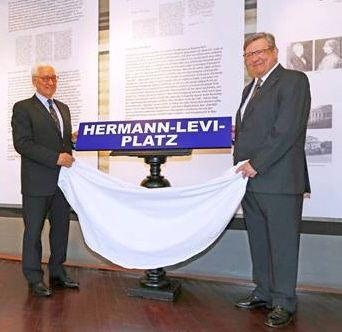Town names square after Wagner’s forgotten conductor
mainKalsruhe has finally decided to honour one of its unsung heroes – the conductor Hermann Levi, who conducted the premiere of Parsifal for Richard Wagner at Bayreuth.
Levi was obliged to endure torrents of antisemitic abuse from all members of the Wagner family.
His name will appear on the square in front of the Karlsruhe opera house, which is presently staging Avner Dorman’s opera on the Wagner family, Wahnfried.






That is really well-deserved…. Levi must have been a great man. They should also have named a street after him in Bayreuth.
But:
“Levi was obliged to endure torrents of antisemitic abuse from all members of the Wagner family.”
…. that is not quite true. To begin with: at the time he only had dealings with Wagner and his wife, other family members being too young to embark upon torrential bullying of their father’s guest. Levi’s relationship with Wagner and Bayreuth was a complex one, and during Wagner’s life not at all characterized by ‘antisemitic torrents’. To begin with, Wagner’s antisemitism was a cultural critique, clothed in racist terms, which is not the same as the virulent antisemitism of later days. Mrs W’s antisemitism was much worse than her husband’s, and she was the real inspiration of later Bayreuthian abberations. Wagner himself greatly liked Levi and was happy to have him as his Parsifal conductor, if only he would convert to Christianity, to be then completely suited to fulfill his Bühnenweifestspielerische Aufgabe. This Levi refused, to Wagner’s irritation, because he needed the Munich orchestra and that was only possible on the condition that Levi would conduct – one of the few instances that King Ludwig refused to give-in to W’s wishes. This meant that he had no leverage whatsoever to press Levi into conversion. At one day during preparations Levi left Bayreuth after he was shown a libellous anonymous nonsense letter, one of those usual Wagnerian feats of tactlessness, after which W had to exercise all his charm to get him back, after which the weight of power structure had definitely leaned to Levi’s side. From letters by Levi to his family it clearly appears that he never held W’s quirks against him, did not take them very seriously, and never stopped admiring him as an artist and liking him very much as a person.
It has been a puzzle to many later biographers how it is possible that so many friends, performers, and public figures, seemed to seriously feel great sympathy for the man while also being perfectly conscious of his crazy tantrums and often tactless and egomaniacal behavior. Wagner has been depicted as a ‘; monster’ in the press – by people who never met him – but this does not relate to the many positive evidence by people who had direct contact with him. The only explanation is, that W had something innocent about him, something spontaneously silly, not quite mature, which worked as a charm. In such coctail of reactions, antisemitism looks more innocent than it later clearly became.
And one wonders what cheap hippy music could possibly contribute to such sordid and complex subject like Wagner’s home:
https://www.youtube.com/watch?v=ARx5bFakOq4
https://www.youtube.com/watch?v=Ic23howPAoM
https://www.youtube.com/watch?v=nB93rrlieN4
Congratulations to KARLSRUHE !
And thank you very much, John Borstlap,
for explaining the antisemitism at the
time in Bayreuth as well as the personal
view regarding of the Maestro himself.
Why the hell did he write such nonesense
at all? Just because he hated Meyerbeer?
We will never ever find out.
I don’t think so…. there has been written a lot about W’s antisemitism, and much of it overlooked W’s naivety, which in his writings seem to have combined continously with alert and profound observations. I always think that this is because W wanted to also be some sort of cultural philosopher but lacked the academic training which would have rendered his writing more analytical.
As for his antisemitism, maybe this explains something of it:
“He saw all around him the corruption and exploitation characterizing the first development of grand industrialization of society, and understood it rightly as destructive and dehumanizing, and a grave threat to culture. Hence his stance against ‘modernity’ as represented by early urbanization and industry. Many successful and brilliant business men and bankers, strong driving forces behind social changes and industrial capitalism, were people from Jewish descent, as many people of the press were (the press was almost always unanimously dismissive of Wagner’s work). Wagner naively – as did so many other people at the time – connected one thing with the other and thought that it was the ‘Jewishness’ which caused all the destructive forces in society. A simplistic and naive mistake of judgement, like thinking – after seeing many red-haired communists – that they are communists because of their hair colour.”
From: ‘Was Wagner a bad person?’ http://johnborstlap.com/was-wagner-a-bad-person/
Yet another apologist for Wagner’s anti-Semitism. The man was clearly a link in the chain that led to Hitler. He was in with Houston Stewart Chamberlain and the leading racial theorists of his day. Don’t try to sweep his anti-Semitism under the rug for your own purposes.
Just read the above comment. Understanding is something different from excusing. Antisemitism is always a moral flaw, in whatever context, but contexts differ and so should our assessments of them.
But speaking of flaws, your understanding is flawed. We all know your type and your attitude toward this subject. You simply wreak of it.
Thank you for demonstrating the mentality which brought forth antisemitism in the first place: lacking in arguments, playing on the man instead of the ball. Pathetic!
Although Houston Stewart Chamberlain was Wagner’s son-in-law the two never met. Chamberlain only married into the Wagner family 25 years after the composer’s death. Whatever arguments might be had about Wagner’s antisemitism they are not advanced by implying a nonexistent connection between the two men.
If you are denying that the anti-Semitic writings of Wagner had a profound influence on Hitler then we might as well say that Schoenberg was a Baroque composer. Or that the sun comes out at night. It’s all spelled out by Hitler in his writings. To deny this simply shows that you’ve never studied the subject in depth like many others have. Please refrain from commenting on subjects such as this if you are only going to conjecture. It does a misdeed to important history.
Talking about reading history….. Hitler did not NEED Wagner’s writings to become antisemitic. Also there is no evidence that H actually read W’s stuff. “Wagner was prejudiced not only against ‘Jewishness’ (which he described as ‘a purely metaphysical concept’) but also against the French and their ‘civilisation’. As Bryan Magee states forcefully in his recent book about Wagner and philosophy, however we might view these prejudices, Wagner himself did not regard them as racial but as cultural. The fact that he was able to have close, even intimate, friends who were of French origin (like Cosima) or of Jewish origin (like Tausig, Porges or Rubinstein) confirms that his prejudices were not racial.” From: http://www.monsalvat.no/racism.htm (well-argued). Joachim Köhler’s notorious “Wagners Hitler. Der Prophet und sein Vollstrecker”, is full of very selective quotations and evidence taken-out of context, as the author himself later-on admitted, when he regretted his earlier book and had been ‘converted’ to an opposite opinion about Wagner’s antisemitism. “Yet Hitler, in his many writings and rantings on Wagner, seems never to have mentioned Wagner’s antipathy to Jews. And this cannot be dismissed as a quirk of omission.” and: “The image of the Jew — a tormenting self-image — focused Wagner’s search for a ‘German’ identity deeply anchored in the spiritual, eternal and ‘tief.’ His own marginality — his uncertain parentage, his transience and exile, his bitterness or ambivalence toward the mainstream — dictated a quest to belong. Of course, this was also a common Jewish quest, and a further affinity binding Wagner and the Jews.” In: http://www.nytimes.com/1998/11/08/arts/the-specter-of-hitler-in-the-music-of-wagner.html
There is more to it than meets the eye, and it is all the result of a fragmented personality with an overdosis of genius and a lack of inner discipline.
Dear Heath – you wrote “He [Richard Wagner] was in with Houston Stewart Chamberlain.” I pointed out that the two men never met and that Chamberlain only married Wagner’s daughter 25 years after the composer’s death. This is not conjecture – these are facts. But perhaps you prefer “alternative facts”..?
Heath, can you back up your claim, that Hitler’s anti-semitism was profoundly influenced by Wagner, and that it is spelled out in his writings? You surely can give us some citations from these writings you know so well?
I have read “Judaism and Music”, Wagner’s infamous “diatribe”, and while the validity of his criticism’s are debatable, his attacks were mostly not religious or ad hominem. His complaint was that secular Jews were trying to assimilate themselves into a tradition, which was totally foreign to them.
However, it was certainly racially based, and he did not anticipate the great blossoming of Jewish musicians in the late 19th century and 20th century. In my opinion, Wagner’s criticism of the Jewish artists is much like the criticism that many harbor against Chinese and Korean musicians.
Wagner’s social ineptitude was certainly more than compensated for in his intelligence. I am both Jewish and a Wagner fan.
That is a great comment.
When the Jews were at last liberated from the ghettos at the beginning of the 19th century, it took some time for them to integrate into society, who would blame them? Because of their cultivation of certain literate skills, many of them quickly found a place at elite level. After a couple of generations, Jewish descent in ethnic terms became entirely irrelevant, and it is utterly despiccable that antisemitism increased the more Europeans of Jewish descent became successful. A culture can be absorbed and identified with also if you come ‘from outside’, a process we witness in these days with immigration in Europe (in spite of the serious mishaps where it goes wrong). Wagner certainly must have seen that people of Jewish descent did not differ in the least with ‘locals’, and this must have confused him and have contributed to his focussing his antisemitism on Jewishness as a cultural attitude rather than race. But again, he was obviously confused on that point anyway. To me it seems clear that he objected to the ‘modernism’ of his day: industrialization, destruction of nature and culture by commerce, etc. etc. and thought it was ‘Judaism’ that was the cause of it all. Given his own doubts about his ethnicity (he might have been the son of a Jew: Geyer), the whole subject must have been very painful to him. So, he somehow deserved his neurosis and the negative associations which accompany his works ever since.
George, you must be kidding. Let’s hear about some of those criticisms of Chinese and Korean musicians. Do we call for their obliteration from the earth? Wagner called for the “untergang” of the Jews in Judaism and Music which you claimed to have read. In case you don’t speak German that means “going under” or “destruction.” You’re simply another apologist for his anti-Semitism. This isn’t about just musical ideas.
The term ‘Untergang’ in the article concerned, can be understood in different ways, and it seems obvious that W meant the disappearance of Judaism. In other writings he suggested that overcoming Judaism was the best Jews could aspire to. These writings are full of unclear, ambiguous and uncooked utterings which would never have been taken seriously if WW II and the Holocaust had never happened. If there is an afterlife, I am sure W would be burning with powerless emotional pain on seeing the relationship so many people want to fix between his antisemitism with the nazis who destroyed Germany, and the great crime. He wanted his work to be the Grand Monument of German culture….. which had been erected already by Beethoven and Brahms.
No one here is an apologist for ‘Judaism in music’, it’s a vile document. But you are applying an interpretation to one word ‘Untergang’ to suit your own particular take on this. In a similar vein to those who cherry pick one isolated line out of act 1 of the Parsifal libretto, focussing on one word ‘Geschlechtes’ (that also is open to a variety of interpretations) and then declare “the meaning of Parsifal is ‘racial purity'”. This claim is manifestly false when seen in the context of the vast complexity of the work.
Dear John,
Two men need not literally meet face to face to work off each others ideas. The conjecture was referring to Hitler.
So… a final attempt to make this clear. Yes Chamberlain was indisputably affected by Wagner but the reverse is not true. The two men never met and there is absolutely no evidence that Wagner was ever aware of Chamberlain’s existence. Chamberlain was in Bayreuth in 1882 but had no personal contact with the Wagner family. He came to Cosima’s attention (and through her became part of the Bayreuth circle) through articles he wrote in the years after Wagner had died.
Therefore to say as you did in your original comment “He [Wagner] was in with Houston Stewart Chamberlain” is simply wrong.
This is the only point I have commented on. I have expressed no opinions about Wagner’s antisemitism or his influence on Hitler.
Even if Hitler was heavily influenced by Wagner, it does not mean that Wagner is responsible for Hitler and the holocaust, or even necessarily a supporter of what the Nazis did (despite the many revolting things he said). We can revile the man, and what he wrote, without holding him responsible for how his words were used by a later generation.
Hermann Levi did much to promote the symphonies of Bruckner. The two met at the rehearsals for Parsifal. Levi proclaimed Bruckner to be the greatest symphonic composer since Beethoven.
Herman Levi was, along with Heinrich Porges one of 2 Jewish pall-bearers at Wagner’s funeral, roles of course invariably reserved for people who were very close to the deceased. I know a lot of people seem to want to swallow the negationist narrative of RW as a simple cartoon villian, but in reality he was a very complex man as most great artists invariably are… If you read Mein Leben you will notice he made quite a habit of simultaneously holding conflicting opinions.
Yes, but that book was a fabrication anyway, to create the image of a Great Artist. It was dictated to his wife who wrote down the text with the golden pen given by Mathilde Wesendonck, so inevitably his recollections were ‘edited’.
No John, that book is predominantly his authentic voice- the blatant redactions and occasional revisions, the obvious contradictions, actually help us to understand, once we learn to recognise them. Together with the brilliant Berlioz memoirs, these books are our best guide to the reality of the 19th century’s great creative minds. I believe you cannot have a true understanding of how we got to where we are today without reading them… and (if you’re like me, obsessed)- doing so multiple times.
I agree that Mein Leben gives ample information about its author and 19C music life, but musicology has decided already long ago that in terms of facts nothing can be really trusted, because the book was meant for King Ludwig which means that a very selective picture had to be projected. Facts described in the book can only be trusted if verified by other sources. And his wife’s monitoring, jealous eye will certainly have had a censorious effect. The Berlioz memoirs are much more reliable. Both are ego documents but Berlioz had no reasons to present his story different from truth for strategic purposes. With RW, the immense difference who he was as a person and the image he, and later-on his circle, wanted to project, explains the unreliable nature of all mythology surrounding him and his work. But that makes it interesting indeed.
All those reservations aside, my sense of Mein Leben’s authenticity comes from the delivery, consistent with all of his writings that I have read, his mind almost tripping over itself to articulate every one of his thoughts before they are lost. That phenomenon is at the heart of both the inconsistency in his writings, and his genius.
As for Berlioz, it should be considered essential reading for all music students but I know hardly anyone in music who has read that book. Why the hell not- Too many Cherubinis in the system perhaps? All a bit too close to the bone?
I think it was Berlioz who said of Cherubini that he had ‘a very equal temperament: always angry’.
One has read that Levy also directed the music at Wagner’s obsequies.
The dread Cosima would have had the last say on that, so what is to be made of
this Wagnerian dislike of Jews? It does seem not to have been of the ‘virulent & eliminationist’ sort. Certainly not. Anyway, Levi knew what he wanted and from whom and seems to have borne the Wagners no ill will, treu bis zum Tod.